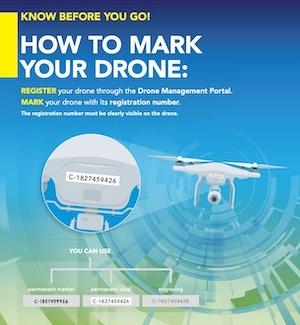Drone Pilots To Register Their Drones And Obtain A Pilot Certificate By June 1, 2019
Transport Canada is committed to enhancing aviation and public safety while encouraging innovation and economic growth in the drone sector. To that end, the Honourable Marc Garneau, Minister of Transport, announced Canada’s new rules for remotely piloted aircraft systems, more commonly known as drones.

The new rules, which will come into force on June 1, 2019, apply to all drone pilots flying drones between 250 grams and 25 kilograms that are operated within the drone pilot’s visual-line-of-sight, regardless of whether the drone is flown for fun, work or research.
“We’ve listened closely to feedback from Canadians and have updated our regulations to balance practicality and the safe use of drones. Drones are part of an important economic sector with significant potential to improve lives and connect communities across the country," said The Honourable Marc Garneau, Minister of Transport. "Our new regulations will create new opportunities for Canadians by establishing a safe and predictable regulatory environment where the industry can innovate and where recreational and non-recreational drone pilots can safely access Canadian airspace.”
The new simplified rules reflect significant consultations with Canadians and the industry. The final regulations introduce two main categories of drone operation: basic and advanced. The categories are based on distance from bystanders and airspace rules.
Both categories have their own set of easy-to-follow rules that will require the drone pilot to:
- register and mark the drone with its registration number;
- pass an online exam and get a pilot certificate for basic or advanced operations;
- be a minimum age of 14 for basic and 16 for advanced operations, unless supervised by a person having proper certificates;
- stay below an altitude of 122 m (400 feet) above ground level; and
- stay away from air traffic.

Only drone pilots who need to fly a drone outside the rules for basic or advanced operations will need to apply for a Special Flight Operations Certificate (SFOC) before they fly.
Transport Canada encourages drone pilots to take the necessary time to review and fully understand the new rules for drones in Canada and to follow a course provided by a drone flight school before attempting to take an online exam or flight review.
Drone pilots will need to have their Pilot Certificate and proof of registration readily available when flying their drone as of June 1, 2019. This can mean having an electronic version available on their mobile device or carrying a printed copy.
Transport Canada has developed an improved, user-friendly website with information on the new regulations and helpful tools for all drone pilots available at: Canada.ca/drone-safety.
Transport Canada’s new drone services are available on our website. We invite drone pilots to create an account in the Drone Management Portal for easy access to these drone services at all times.
Until the new rules come into force on June 1, 2019, recreational drone pilots must continue to follow the rules of the Interim Order Respecting the Use of Model Aircraft and pilots using their drone for work or research must continue to follow the conditions of their Special Flight Operations Certificate.
All drone pilots are also subject to the Criminal Code as well as all provincial, territorial, and municipal laws governing areas such as privacy and trespassing. Endangering the safety of an aircraft is a serious offence. Anyone who violates the regulations could be subject to additional fines of up to $25,000 and/or prison. This applies to drones of any size used for any purpose.
(Infographics provided with Transport Canada news release)
 ANN's Daily Aero-Term (12.14.25): Local Airport Advisory (LAA)
ANN's Daily Aero-Term (12.14.25): Local Airport Advisory (LAA) Airborne 12.08.25: Samaritans Purse Hijack, FAA Med Relief, China Rocket Fail
Airborne 12.08.25: Samaritans Purse Hijack, FAA Med Relief, China Rocket Fail ANN's Daily Aero-Linx (12.15.25)
ANN's Daily Aero-Linx (12.15.25) Airborne 12.10.25: New Gulfstream, ATC Integrator, Outrageous FFZ User Fees
Airborne 12.10.25: New Gulfstream, ATC Integrator, Outrageous FFZ User Fees Airborne-NextGen 12.09.25: Amazon Crash, China Rocket Accident, UAV Black Hawk
Airborne-NextGen 12.09.25: Amazon Crash, China Rocket Accident, UAV Black Hawk




